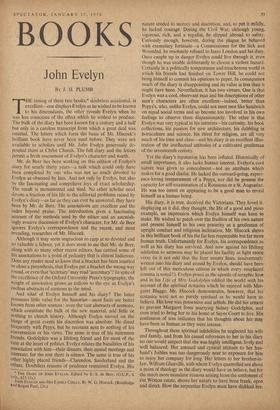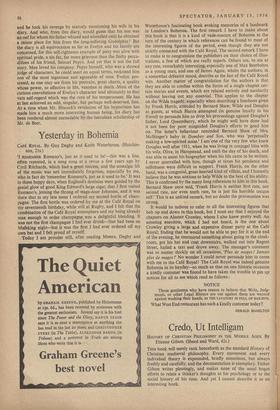BOOKS
John Evelyn
BY J. H. PLUMB
THE timing of these two books,* doubtless accidental, is excellent—one displays Evelyn as he wished to be known to his descendants, the other reveals Evelyn when he was less conscious of the effect which he wished to produce. The bulk of the diary has been known for a century and a half but only in a careless transcript from which a great deal was omitted. The letters which form the basis of Mr. Hiscock's brilliant book have never been used before. They were not available to scholars until Mr. John Evelyn generously de- posited them at Christ Church. The full diary and the letters permit a fresh assessment of Evelyn's character and worth.
Mr. de Beer has been working on this edition of Evelyn's diary for nearly thirty years—a task which could only have been completed by one who was not so much devoted to Evelyn as obsessed by him. And not only by Evelyn, but also by the fascinating and compulsive joys of exact scholarship. The result is monumental and final. No other scholar need devote a fraction of his life to the editorial problems raised by Evelyn's diary-7as far as they can ever be answered, they have been by Mr. de Beer. The annotations are excellent and the index beyond praise. The introduction gives a fascinating account of the methods used by the editor and an astonish- ingly evasive discussion of Evelyn's character, for Mr. de Beer ignores Evelyn's correspondence and the recent, and most revealing, researches of Mr. Hiscock. and so it may seem ungracious to carp at so devoted and so valuable a labour, yet it does seem to me that Mr. de Beer, along with so many other recent editors, has carried some of his annotations to a point of pedantry that is almost ludicrous. Does any reader need to know that a bracket has been inserted to close a parenthesis, that Evelyn put a bracket the wrong way round, or even that 'secretary' may read `scecretary'? In spite of the excellence of the Oxford University Press's typography, then weight of annotation grows as tedious to thc eye as Evelyn's endless abstracts of sermons to thc mind.
And what of Evelyn himself and his diary? The latter Possesses little value for the historian—most facts are better known from other sources : even the vast abstracts of sermons, which constitute the bulk of thc new material, add little or nothing to church history. Although Evelyn moved on the fringe of great events his discretion was absolute. He dined frequently with Pepys, but he recounts next to nothing of his conversation or his views. The same is true of his statesmen friends. Godolphin was a lifelong friend and for most of the time at the heart of politics. Evelyn relates the banalities of his association with him—their dinners, their casual meetings and interests; for the rest there is silence. The same is true of his other highly placed friends—Clarendon, Sunderland and the others. Doubtless reasons of prudence restrained Evelyn. His * THE DIARY or JOHN EVELYN. Edited by E. S. de Beer. (O.U.P., 6 vols., £15 15s.) JOHN EVELYN AND HIS FAMILY CIRCLE. By W. G. Hiscock. (Routledge and Kegan Paul, 25s.) nature tended to secrecy and discretion. and. to put it mildly, he lacked courage. During the Civil War, although young, vigorous, rich, and a royalist, he slipped abroad to safety. Curiously enough, however, during the plague he behaved with exemplary fortitude—a Commissioner for the Sick and Wounded, he resolutely refused to leave London and his duty. Once caught up in danger Evelyn could live through it, even though he was unable deliberately to choose a violent hazard. Certainly in a politically tempestuous and treacherous world in which his friends had finished on Tower Hill. he could not bring himself to commit his opinions to paper. In consequence much of the diary is disappointing and its value is less than it might have been. Nevertheless, it has two virtues. One is that Evelyn was a cool, observant man and his descriptions of other men's characters are often excellent—indeed, better than Pepys's, who, unlike Evelyn, could not meet men like Sandwich on equal social terms and so become too involved in his own feelings to observe them dispassionately. The other is that Evelyn was very typical in his interests—his curiosity, his book collections, his passion for new architecture, his dabbling in horticulture and science, his thirst for religion, are all very much of his time and class—and his diary is an excellent illus- tration of the intellectual attitudes of a cultivated gentleman of the seventeenth century.
Yet the diary's reputation has been inflated. Historically of small importance, it also lacks human interest. Evelyn's cool nature was given to concealment—not an attribute which makes for a good diarist. He lacked the outward-going, experi- ence-loving temperament of a Pepys, nor did he possess the capacity for self-examination of a Rousseau or a St. Augustine. He was too intent on appearing to be a good man to reveal himself as a human being.
His diary, it is true, deceived the Victorians. They loved it. displaying as it did, they thought, thc life of a good and pious example, an impression which Evelyn himself was keen to make. He wished to patch over the frailties of his own nature and present himself to his own posterity as a gentleman of upright conduct and religious inclination. Mr. Hiscock shows in this brilliant book of his the far less respectable but far more human truth. Unfortunately for Evelyn, his correspondence as well as his diary has survived. And now against his lifelong addiction to sermons may be placed his facility at light erotic verse (is it not odd that the four smutty lines, inadvertently written into his diary and erased by Evelyn, should have been left out of this meticulous edition in which every misplaced comma is noted?). Evelyn posed as the apostle of seraphic love and in his Lik of Mrs. Godolphin edified the world with his account of the spiritual ecstasies which he enjoyed with Mar- garet Blagge. Mr. Hiscock demonstrates, however, that his ecstasies were not so purely spiritual as he would have us believe. His love was possessive and selfish. He did his utmost to prevent Margaret from marrying Sidney Godolphin, and even tried to bring her to his home at Sayes Court to live. His confession of sins indicates that his thoughts about her may have been as human as they were intense.
Throughout these spiritual infidelities he neglected his, wife and family, and from his casual references to her in his diary no one would suspect that she was highly intelligent, lively and well balanced. Her amused and cynical attitude to her hus- band's foibles was too dangerously near to exposure for him to enjoy her company for long. Her letters to her brother-in- law, William Glanville, with whom Evelyn quarrelled not about a point of theology as the diary would have us believe, but for the much more mundane reasons arising from the settlement of the Wbtton estate, shows her nature to have been frank, open and direct. How the serpentine Evelyn must have disliked her,
and he took his revenge by scarcely mentioning his wife in his diary. And who, from this diary, would guess that his son was an oaf for whom his father whined and wheedled until he obtained a minor place for him from the long-suffering Godolphin? But the diary is all equivocation as far as Evelyn and his family are concerned, for this self-righteous example of piety was alive with spiritual pride, a sin far, far more grievous than the fleshy pecca- dilloes of his friend, Samuel Pepys. And yet that is not the full story. Men loved his company. Pepys himself, who was a shrewd judge of characters, he could meet on equal terms, reckoned him one of the most ingenious and agreeable of men. Evelyn pos- sessed, as one may see from his portraits, great charm, a quality whose power, so effective in life, vanishes at death. ,Most of the curious convolutions of Evelyn's character lead ultimately to that vain self-regard which was the core of his temperament. He has at last achieved an odd, singular, but perhaps well-deserved, fate. At• a time when Mr. Hiscock's revelation of his hypocrisies has made him a much more interesting human being, his diary has been rendered almost unreadable by the herculean scholarship of Mr. de Beer.



































 Previous page
Previous page